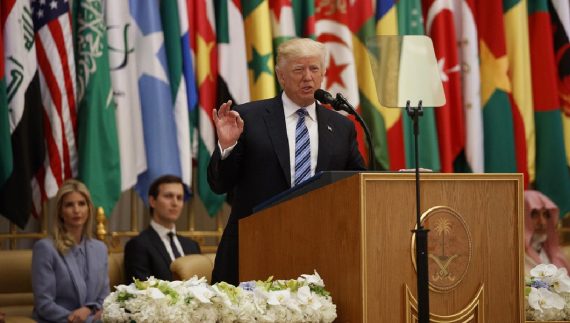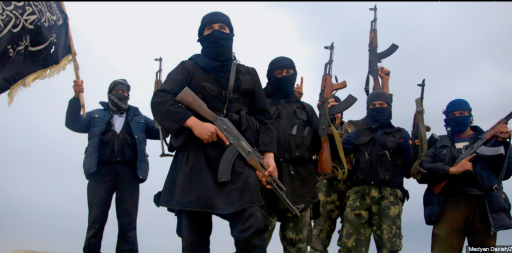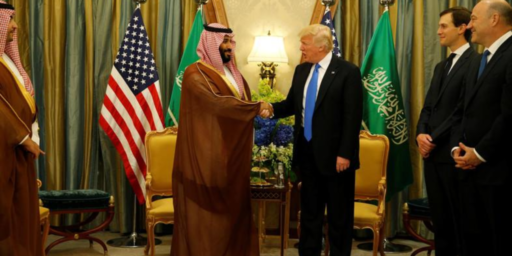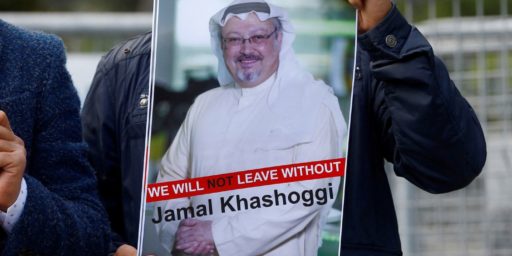Trump’s Muslim Speech Was A Change In Tone, But It’s Unlikely To Accomplish Anything
President Trump's speech on Islam was a change of tone. However, as critics noted, it was short on substance and is unlikely to accomplish anything.
In what was billed as the capstone to his two-day visit to Saudi Arabia, the first stop on a rather ambitious and potentially exhausting nine-day foreign trip that will also take him to Israel, the Vatican, and Sicily, President Trump gave a speech to the leaders of many Muslim-majority nations that deviated sharply from his campaign rhetoric, but which is nonetheless being criticized in some quarters for its mixed messages:
RIYADH, Saudi Arabia — President Trump on Sunday pivoted away from his strident assessment of Islam as a religion of hatred as he sought to redefine American leadership in the Middle East and rally the Muslim world to join him in a renewed campaign against extremism.
Addressing dozens of leaders from across the Muslim world who had gathered in Saudi Arabia, Mr. Trump rejected the idea that the fight against terrorism was a struggle between religions, and he promised not to scold them about human rights in their countries. But he challenged Muslim leaders to step up their efforts to counter a “wicked ideology” and purge the “foot soldiers of evil” from their societies.
“This is not a battle between different faiths, different sects or different civilizations,” Mr. Trump said in a cavernous hall filled with heads of state eager to find favor with the new president. “This is a battle between barbaric criminals who seek to obliterate human life and decent people, all in the name of religion, people that want to protect life and want to protect their religion. This is a battle between good and evil.”
The president’s measured tone here was a far cry from his incendiary language on the campaign trail last year, when he said that “Islam hates us” and called for a “total and complete shutdown” of Muslims entering the United States.
Throughout his visit, a less volatile president emerged, disciplined and relentlessly on message in a way he is often not at home. He did not brag about his electoral victory and avoided tangents. With few exceptions, he stuck carefully to his teleprompter. His mood has been sober and careful.
By refusing to hold news conferences or answer questions during brief photo opportunities, Mr. Trump orchestrated a sense of diplomatic calm that contrasted sharply with the chaos that usually surrounds him in Washington. He has not used Twitter as a cudgel against adversaries since his overseas trip began.
In his speech on Sunday, he made no mention of the executive orders he signed after taking office barring visitors from several predominantly Muslim countries. Instead, he described Islam as “one of the world’s great faiths” and called for “tolerance and respect for each other.”
While in the past Mr. Trump repeatedly criticized President Barack Obama and others for not using the phrase “radical Islamic terrorism,” his staff sought to ensure that he would not use it before this Muslim audience. The final draft of the speech had him instead embracing a subtle but significant switch, using the term “Islamist extremism.” Islamist is often defined to mean someone who advocates Islamic fundamentalism, and some experts prefer its use to avoid tarring the entire religion.
When that moment in the speech came, however, Mr. Trump went off script and used both words, Islamic and Islamist. “That means honestly confronting the crisis of Islamic extremism and the Islamists and Islamic terror of all kinds,” he said. An aide said afterward that the president was “just an exhausted guy” and had tripped over the term, rather than rejected the language suggested by his aides.
But if the speech during the second day of a nine-day overseas trip was intended as a sort of reset from his campaign and early presidency, it was also meant to turn away from Mr. Obama’s approach. Rather than preach about human rights or democracy, Mr. Trump said he wanted “partners, not perfection.” And he said it was up to Muslim leaders to expunge extremists from their midst.
“Drive them out,” he said. “Drive them out of your places of worship. Drive them out of your communities. Drive them out of your holy land. And drive them out of this earth.”
Mr. Trump received a warm welcome in the room as Muslim leaders put behind them the messages of the campaign and the attempted travel ban, and he has gotten along well with fellow leaders, who have turned to flattery.
“You are a unique personality that is capable of doing the impossible,” President Abdel Fattah el-Sisi of Egypt told him.
“I agree!” Mr. Trump responded cheerily, as laughter rolled through the room.
A few moments later, Mr. Trump returned the compliment, in a fashion. “Love your shoes,” he told Mr. Sisi. “Boy, those shoes. Man!”
But some activists back in the United States gave the president mixed reviews at the start of his trip.
“While President Trump’s address today in Saudi Arabia appears to be an attempt to set a new and more productive tone in relations with the Muslim world, one speech cannot outweigh years of anti-Muslim rhetoric and policy proposals,” Nihad Awad, the executive director of the Council on American-Islamic Relations, said in a statement.
(…)
Mr. Trump made little mention of human rights in any of the meetings, and he promised in his speech not to do so publicly. “We are not here to lecture,” he said. “We are not here to tell other people how to live, what to do, who to be, or how to worship. Instead, we are here to offer partnership — based on shared interests and values — to pursue a better future for us all.”
That approach drew bipartisan criticism back in Washington. “It’s in our national security interest to advocate for democracy and freedom and human rights,” Senator Marco Rubio, Republican of Florida, said on CNN’s “State of the Union.” On the same program, Representative Adam B. Schiff, Democrat of California, called it “a terrible abdication of our global leadership.”
Michele Dunne, the director of the Middle East program at the Carnegie Endowment for International Peace, said the president had laid blame for terrorism on Muslim leaders who he says have not done enough. “There are elements of truth to Trump’s narrative,” she said, “but it ignores the deeper grievances, the political and economic injustices, that make young people in the region especially susceptible to extremist ideologies at this particular time.”
Notwithstanding the criticism, one of the more significant things about Trump’s speech was the manner in which it different so significantly from his tone on the campaign trail and in press interviews during the Presidential campaign. During that time, of course, Trump’s rhetoric about Islam in general and Muslim immigrants to the United States was among the most vitriolic of any of the candidates for the Republican nomination. He suggested that Islam was, at it’s core, an evil religion that hated the United States, even the nations he was reaching out to in his speech yesterday such as Saudi Arabia could not be trusted, and suggested that Muslim-Americans as a whole were celebrating when terrorists attacked the United States on September 11, 2001 based on what later turned out to be disputed, and largely debunked news reports. As a matter of policy, he called for increased surveillance of mosques and communities where Muslim immigrants predominantly settled and, of course, ultimately called for a ban on immigration from all Muslim countries “until we can figure out what the hell is going on.” Additionally, he joined most of his fellow Republican candidates in attacking President Obama and other officials who declined to use the phrase “radical Islamic terrorism,” as if doing so would somehow magically transform the War On Terror. Finally, once he was in office, Trump signed an Executive Order imposing a ban on travel and immigration from certain majority-Muslim nations, although it notably excluded nations that actually were the source of terrorism over the past two decades such as Egypt, Saudi Arabia, the United Arab Emirates, and Pakistan. Taken in this context
Taken in this context, Trump’s speech yesterday certainly was a change in tone from a President who had been among the most anti-Muslim candidates in the 2016 Presidential field. Additionally, it was notable for the extent to which it seemed to acknowledge the need for American involvement in the Middle East as part of the fight against terrorism and to extend an olive branch toward Muslim nations that he had been extremely critical of in the past. At the same time, though, the speech was not without its problems. Many critics noted the fact that Trump essentially ignored, and indeed brushed aside, questions of human rights in nations that would be considered allies in this battle. This includes Egypt, where the authoritarian regime of President el-Sisi continues to repress dissent and government critics in the name of internal security, and Pakistan, where blasphemy laws and other government actions continue to repress non-Muslims and people who dissent from the rule of the government. Most prominent on the list, of course, is Saudi Arabia, where people are beheaded, have their hands chopped off, or are whipped in public for breaking the law, where it’s illegal to be gay or lesbian, and where women are forbidden to be in public alone, to drive, and, except in limited instances, to vote or hold political office. For each of these nations and more, Trump’s speech was basically a license to continue these policies without fear as long as they remained allies in the “War On Terror.”
All of that being said, as CNN notes the President’s speech was not without its critics:
Former Jordanian Justice Minister Ibrahim Aljazy said Trump’s shift in tone toward Muslims was notable.
“Trump has moved from ‘Islam hates us’ to a friendlier approach of common values and shared interests,” he said.
But Aljazy said Jordanians and others in the Muslim world had hoped Trump would deliver clearer answers on American policy in the region.
“I would not call it a constructive tone since that people in the region, particularly Jordanians, are looking for a more clear approach to the Israeli policies and an end to settlements, which may pave the way for a true two-state solution and end of occupation,” he said.
“Referencing ‘Islamic’ terrorist organizations only will not be appreciated by the vast majority of people in the region when other forces are carrying out acts of aggression, especially as Arabs and Muslims are the prime victims of these organizations,” he said.
Hamed Mousavi, a political science professor at Iran’s Tehran University, said that Trump’s attempts to strike a friendlier tone in Saudi Arabia were hard to swallow.
“It will be met with deep skepticism in the Muslim world because Trump has been hostile and offensive to Muslims — with his Muslim travel ban, for example. All they’ve seen so far from Donald Trump is a lot of hostility,” he said.
Mousavi said that by making lucrative arms deals with Saudi Arabia, the United States has lost its ability to put pressure on Riyadh to reform Wahhabism, a fundamentalist brand of Islam that insists on a strict interpretation of the Koran.
Anne Applebaum, meanwhile, called Trump’s speech and visit “bizarre and Un-American,” while The New Yorker’s Robin Wright notes that Trump’s strategy on fighting terrorism was “simplistic” and unlikely to succeed. Finally, Daniel Larison gave one of the harsher assessments of Trump’s speech:
Trump’s embrace of the Saudis and their agenda is in keeping with his general enthusiasm for our most authoritarian clients and allies, and the speech was a statement of his administration’s Iran obsession and what passes for conventional wisdom in Washington regarding relations with our clients in the region. According to the latter view, Obama was insufficiently supportive of U.S. clients in the region and too open to accommodating Iran, and so Trump has made a point of proving how different he is from Obama by subordinating U.S. policy in the region to the preferences of Riyadh. Where Obama was shamefully supportive of the Saudis, as he was in Yemen, Trump insists on being even more so, and where Obama offered mildly critical (and empty) rhetoric about Saudi behavior Trump will offer nothing but praise. If the Saudis and their allies weren’t the authors of the world’s worst humanitarian crisis, and if our government wasn’t deepening its complicity in their war crimes in Yemen, the pathetic coddling of the Saudis might not be quite so obnoxious, but they are and it is.
The display the president put on in Riyadh is what happens when the U.S. makes keeping “no daylight” with its clients the top priority. Not only is there no criticism of the client’s behavior, no matter how deserved such criticism might be, but there is excessive fawning and stroking of the client’s ego that creates the false impression that we need them far more than they need us.
On balance, it seems apparent that the critics have a point here. While the change in tone in Trump’s speech is notable, the substance of what he actually said ranges from either being bland and meaningless to being alarmingly unwise. For example, Trump appears to be suggesting a strategy that focuses entirely on military solutions to the terror problem while largely ignoring the human rights abuses and economic problems that have given rise to the conditions that have turned nations into ample breeding grounds for terrorism. Additionally, ignoring the role that Saudi Arabia and Wahhabism have played in that entire process is a massive blind spot that makes it unlikely that any strategy to succeed. Finally, solidifying alliances with authoritarian dictators whose own days are likely numbered, and openly saying that the United States won’t criticize them for human rights abuses, would seem to only guarantee that resentment toward the west in general and the United States in particular will increase as long as those abuses are allowed to continue. In other words, the speech was far less than meets the eye and unlikely to accomplish anything.







I agree with Mr. Larison’s assessment. In the context of the visit, Trump was praising the “good” Muslims and distinguishing them from the “bad” ones. The rulers of Saudi Arabia are clearly counted among the good ones by this visit. The speech and the visit as a whole is intended to bind the US ever closer to the House of Saud. How good they are versus Iran is debatable in my mind, but Trump has bound himself to them 100%.
Doing everything he criticizes others for.
Hypocritical gas-bag.
Santorum suggested this speech proves Trump doesn’t hate Muslims and thus should be use to reverse the court blocks on his Executive Order in immigration. Laughable.
Of course, Trump remains months overdue on presenting his ‘fantastic’ plan to improve security.
I see this as a huge positive. Yes, it’s vague and not really helpful. Yes, if any of his base are paying any attention they’ll have to rationalize this as fake news, or the medialites made him say it, or he’s lying to the rag heads. But he managed to read it off the teleprompter without going off into the ozone and without drooling, and unlike the State of the Union, I haven’t seen much of the Halperin, Fournier, Todd sort of he’s pivoted, he was presidential crap. Maybe our media are learning. I do, however, see a lot of BS about what Trumps policy is and what this or that means to furthering his policy. People, he’s faking it, he doesn’t have a policy, or at least not for more than about five minutes. He wants to talk about middle east peace, he likes to blow that he’ll make a great, yuuge ME peace. He wants to be admired as a great peacemaker. That doesn’t mean he has a plan or policy for doing it.
@gVOR08:
Bingo.
It’s hard to know who is more infantile: the American president or the Americans who like him.
Then again, that is probably a distinction without a difference.
@gVOR08:
Trump’s base over at Lucianne.com is cooing with ecstasy over this speech. So statesmanlike! So visionary! Best speech ever given by any president any time!
Good Muslims = rich guys who give him lots of praise, gifts and over-the-top photo ops
Bad Muslims = not-rich people who want to become Americans and raise their children to be free
Okay, got it.
Somewhat OT, but Nikki Haley will probably be looking for another job soon. She said this morning that the Russia probe was absolutely necessary. Mangolini is going to hate that.
It was a decent speech and he’s basically continuing the long policy we’ve had of cozying up to teh Saudis. No, it doesn’t change anything. But this mideast trip is looking a lot less likely to start World War Three so that’s … something?
@Hal_10000:
Probably the best we can hope for: Hasn’t started WWIII yet.
It is probably a big mistake to take sides in the Sunni-Shia divide. Radical Islam is almost all Sunni. You don’t see a worldwide metasizing of violence from the Shia side. So unless Saudi Arabia and other Gulf countries go after their own radicals, then all this weaponry are going to be directed at Iran (and Shia Iraq). It really makes no sense.
@Scott:
Saudi Wahhabism seems to be the source of most Islamic terrorism.
Wahhabis are extreme Sunnis, but they are rigid about the distinction.
he promised not to scold them about human rights in their countries.
I’m not sure even Trump is hypocritical enough to discuss human rights when he clearly favors authoritarian leaders such as Putin, Erdogan and Duterte. Although he probably is but he stayed on script and used the teleprompters (but in a good way, not like Obama who used them because he wasn’t smart enough).
@SenyorDave:
Don’t forget he’s had some kind words for Kim, too.
@Hal_10000:
Wait….so he CAN be trusted with the nuclear codes!?!
First he’s no longer Hitler, and now this! I don’t think I can take much more of this!
@CSK: She was already on thin ice for getting better press than him.
@TM01:
It’s cute that someone calling a speech better-than-horrible is all the reason you need to trust someone with nuclear codes.
@TM00.00000000000000000000000000000:..
I don’t think I can take much more of this!
Good old President Pud really tickles your testicles doesn’t he!
@Jen:
This may well tear it for him. Nobody’s supposed to get better press than Donny. Nobody.
@TM01:
Hey, still waiting for an answer on which Trump lie about Comey you prefer.
Why won’t you answer the question? You want to talk politics with the grown-ups, then be a grown-up and answer.
Hopefully Trump can get something going regarding a real working partnership involving Egypt, Israel, Arabia, and even maybe Iran. They could help end a lot of the radical Islam activity. Syria will remain a problem.
Trump is the first president to visit the Western Wall. This is an historic event and can help bring a breakthrough. “One of the most important events in middle east history.” Things may really start to change quickly now.